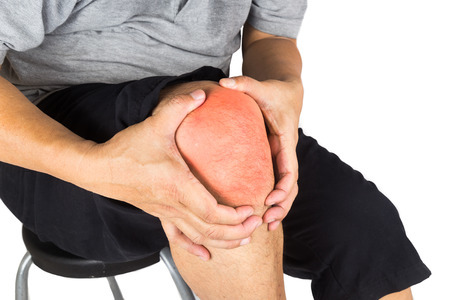Reactive arthritis
Key points about reactive arthritis
- Reactive arthritis (reactive arthropathy) is joint pain, swelling, stiffness or redness after an infection somewhere else in your body.
- It usually happens 1 to 4 weeks after an infection in your gut (eg, food poisoning) or in your bladder or genitals (eg, chlamydia).
- Reactive arthritis normally goes away on its own within a few months without causing ongoing problems.

Causes
For reasons that are still unclear, the immune system (the body's defence against infection) overreacts in response to an infection and starts attacking healthy tissue in the joints, causing them to become inflamed.
You can't catch reactive arthritis from another person. Only very few people who get gut or genital infections will get reactive arthritis.
Who is affected
- Reactive arthritis is most common in men 20–40 years old.
- People born with the HLA-B27 gene are more likely to get reactive arthritis.
- People who have had a sexually transmitted infection (STI) such as chlamydia or gonorrhoea. In men, the STI usually has symptoms. In women, the STI may have no symptoms but they can still develop reactive arthritis.
- People with HIV.
- People who have had food poisoning, even very mildly.
Symptoms are likely to occur in your joints but reactive arthritis can cause problems in other parts of your body as well.

Image credit: 123rf
- Joint inflammation: Including pain and stiffness, usually of your knees, ankles or toes. Pain can be in your fingers, wrists, elbows, low back, buttocks, heels and the soles of your feet. Your toes or fingers might get so swollen they look like sausages.
- Urinary problems: You might notice you need to pee (urinate) more often, and it might hurt to pee. Your prostate gland or cervix might hurt.
- Eye inflammation: Painful, irritated, red eyes (conjunctivitis).
- Skin problems: You might get mouth ulcers or a rash on the soles of your feet or the palms of your hands. Men may get a rash on their penis.
Diagnosis
If you get sore joints within a month of having a gut or genital infection make an appointment to see your doctor. They will talk with you carefully about what has happened and do an examination. They may need to do a blood test, X-ray or use a needle to get some fluid from a joint. This is mostly to rule out other causes of arthritis because there isn't a single test that will tell you if you have reactive arthritis. Your doctor might refer you to a rheumatologist (joint specialist).
Treatment
Treatment will depend on what stage your condition is at:
- Antibiotics may be prescribed to treat the bacterial infection that triggered the reactive arthritis.
- Non-steroidal anti-inflammatory drugs (NSAIDS) can be used to reduce joint pain and inflammation.
- Severe joint inflammation not relieved by NSAIDs may be treated with a corticosteroid injected directly into the joint or by mouth.
- In some cases, severe symptoms of arthritis that don't respond to NSAIDs or corticosteroids may be treated with a DMARD (disease-modifying antirheumatic drug) by a rheumatologist.
The symptoms will disappear within 12 months for most people.
The symptoms usually last 3 to 12 months, however, a small percentage of individuals may have a recurrence of symptoms and develop a long-term condition.
In the early stages, get plenty of rest and avoid using affected joints. As your symptoms improve, you will slowly need to start exercises to strengthen affected muscles and improve the range of movement in your affected joints.
Your healthcare provider or specialist may recommend a suitable exercise programme for your arthritis, or may refer you to a physiotherapist. You may also find ice packs and heat pads useful in reducing joint pain and swelling. Don't place these directly on your skin.
Apps reviewed by Healthify
You may find it useful to look at some physiotherapy and exercise apps, and joint and bone health apps.
If you would like to talk to someone about reactive arthritis you can call one of the Arthritis Educators at Arthritis New Zealand. Just ask for them when you call 0800 663 463.
Forms of arthritis(external link) Arthritis NZ
Reactive arthritis(external link) Arthritis NZ
Reactive artropathy(external link) DermNet NZ
Reactive arthritis(external link) National Institute of Arthritis and Musculoskeletal and Skin Diseases (NIAMS), US, 2021
Pain management(external link) Arthritis New Zealand, 2013. Also available in Hindi(external link).
Apps
Physiotherapy and exercise apps
Joint and bone health apps
References
- Reactive arthritis(external link) Mayo Clinic, US
- Reactive arthropathy(external link) DermNet NZ
Credits: Healthify editorial team. Healthify is brought to you by Health Navigator Charitable Trust.
Reviewed by: Dr Emma Dunning, Clinical Editor and Adviser
Last reviewed:
Page last updated:





